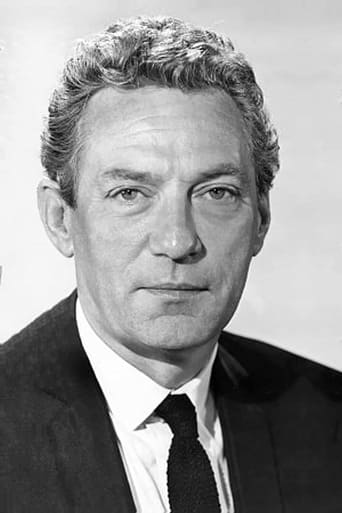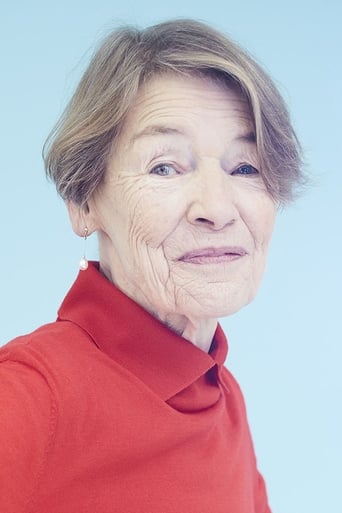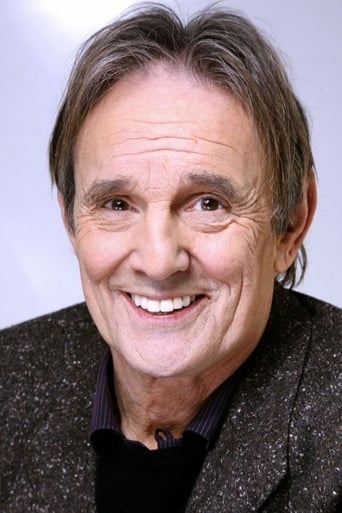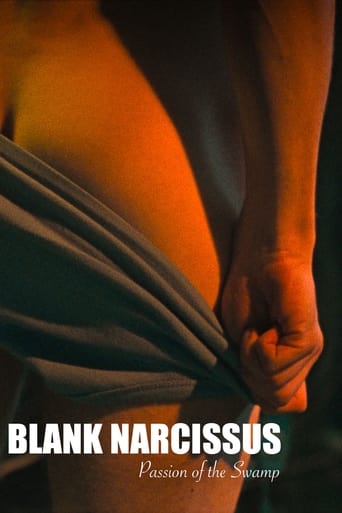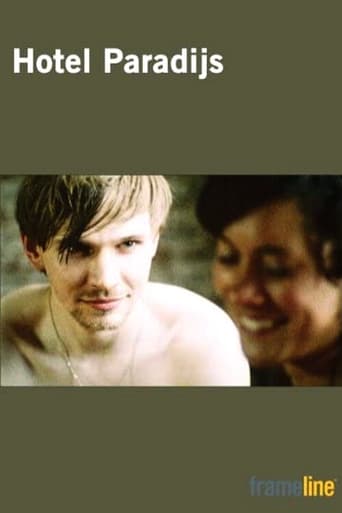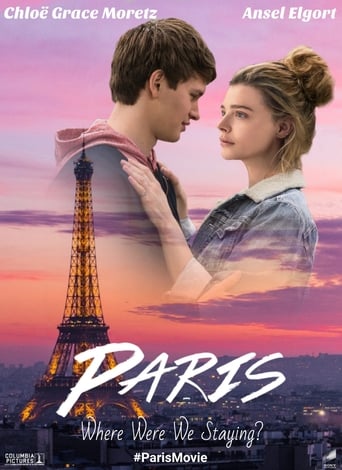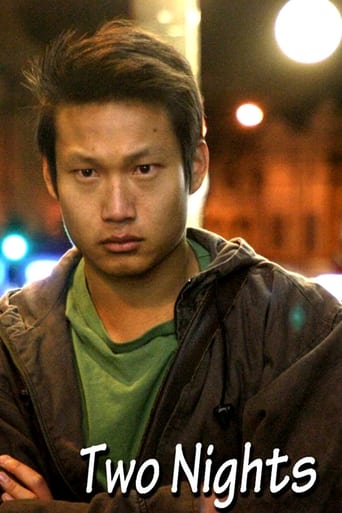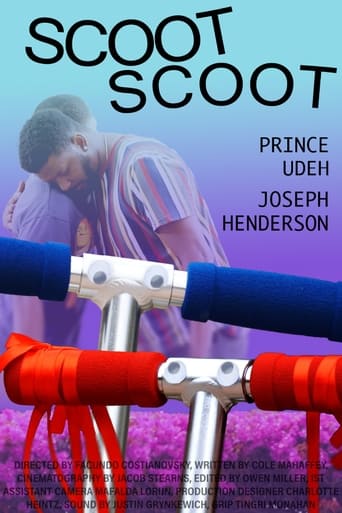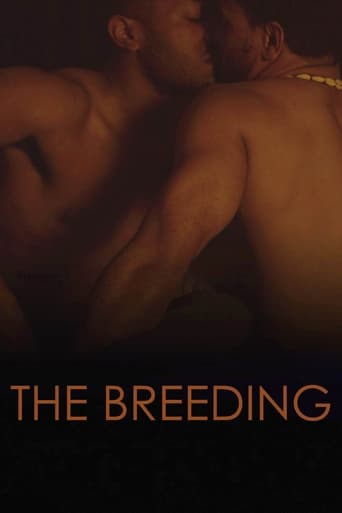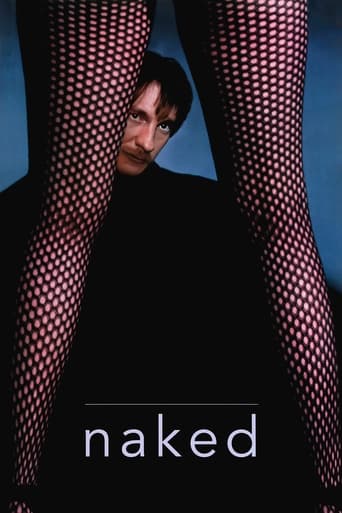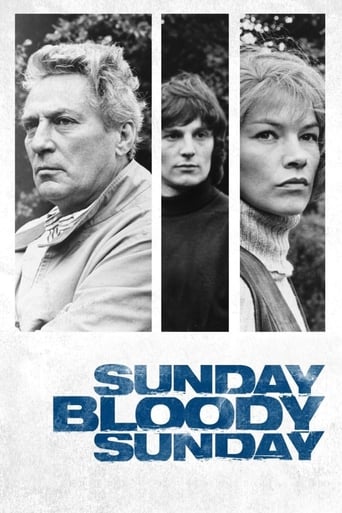
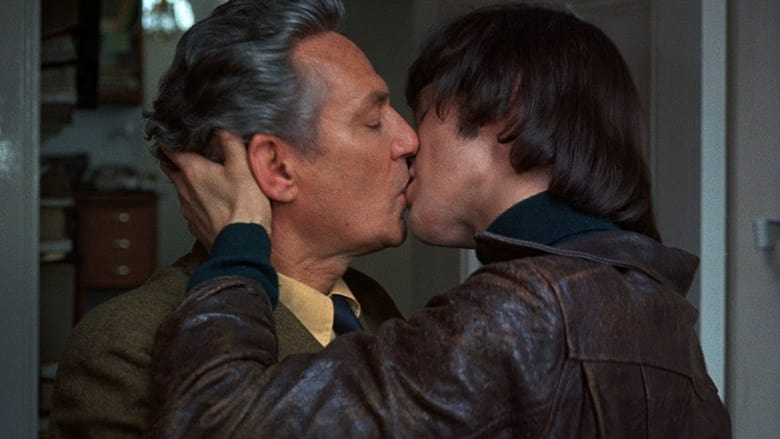
Sunday Bloody Sunday (1971)
Recently divorced career woman Alex Greville begins a romantic relationship with glamorous mod artist Bob Elkin, fully aware that he's also intimately involved with middle-aged doctor Daniel Hirsh. For both Alex and Daniel, the younger man represents a break with their repressive pasts, and though both know that Bob is seeing both of them, neither is willing to let go of the youth and vitality he brings to their otherwise stable lives.
Watch Trailer
Cast


Similar titles
Reviews
This film ranks 65th on the BFI's Top 100, with Peter Finch, Glenda Jackson, John Schlesinger, and Penelope Gilliatt receiving Oscar nominations for Best Actor, Best Actress, Best Director, and Best Writing, (Story and Screenplay), respectively.Dr. Daniel Hirsh (Peter Finch) and Alex Greville (Glenda Jackson) share the same phone answering service and the same lover, Bob Elkin (Murray Head). They both know about their competitive positions in this love triangle and begrudgingly accept them. I read most of the rave IMDb User Comments about the 'bravery' of Finch to take on this homosexual role and Schlesinger to openly show it, as well the new twist on the 'love triangle' theme. However, I would hope that the movie has something more to offer than just being a cultural ground breaker. That, alone, would NOT make the movie a masterpiece. What DOES make it a minor masterpiece is the character study of the three principals and the underlying rationale that drives Daniel and Alex to put up with sharing a common lover at all, no matter what his or her sexual orientation is. Alex says something like 'sometimes I think it is better to have half of anything rather than all of nothing' and Daniel, through his actions, says much the same thing. But, Alex seems to be paralyzed to commit to love again after her former marriage. As her mother (played by Peggy Ashcroft) says, 'Darling you keep throwing your hand in because you're waiting for the whole thing. There IS no whole thing.'Daniel, an up-scale London physician, is a caring family man, shown by his appearance at his nephew's bar mitzvah. Daniel is forced to keep his private life private. (At the time this movie was made, it would have been hard to be a gay up-scale London physician.) Bob, the fulcrum of the triangle, seems to have everything going for him that his two partners don't: if each of them have half of him, he has both of them. That's not to say that he isn't loving and supportive to both. He is..to a point. Bob isn't bad. He is just young, attractive, and free from social restraints—an enviable position in this triangle.The vehicle for the main story line centers around a weekend where Alex and Bob are able to be 'ALONE' together by taking care of a progressive couple's five children as the couple goes out of town to a lecture. Some of the family's pseudo-progressiveness serves to give us both comic relief and anxious moments. The story is a well-told character study, with quick flashbacks to show some of Daniel's and Alex's thoughts and memories to illustrate where they are coming from in their present situations.
After surprisingly scooping Oscar's top honour with the X-rated MIDNIGHT COWBOY (1969), a feat hasn't been emulated ever since, John Schlesinger had earned more cachet and creative leeway to his next project, Sunday BLOODY Sunday, a seminal character examination about a bi-sexual young artist Bob Elkin (Head) in London and his simultaneous and mutually consented relationships with a middle-aged Jewish doctor Daniel Hirsh (Peter Finch) and a female recruitment consultant Alex Greville (Jackson), which allegedly is inspired by Schlesinger's personal affair with actor John Steiner.The description above might mislead you believe that Bob is the main focus point here, but, in fact, Penelope Gilliatt's awards-winning script installs the spotlight alternately on Daniel and Alex, one is cerebral, another is spontaneous. Not only they share the same man, unwitting to them, they also share the same telephone answering service (a diverting cameo from Bessie Love as the overworking answering lady), a source of gossip at then. Aptly, Gilliatt's script, Schlesinger's discreet directorial guideline and the cast's collective effort conspire to bring to light of the unconventional two-faceted relationships, in uttermost honesty, both under a personal emotion scale and a bigger social context, where the back-stories of Daniel and Alex are laid out in between sharp commentaries about a forbidding and shifting London at the turn of 70s, through the lens of tawdry installation art, news snippets from the car radio, pot-smoking kids under a liberal parenting guidance, midnight-awaiting addicts in the drugstore, the booming hippie culture, youth delinquents etc.Homosexuality, the elephant-in-the-room taboo, gets a more realistic and positive spin in this film, Daniel is still in the closet, but he is no longer being crucified, neither inwardly nor outwardly, in the regal bar mitzvah ceremony, he can swiftly mingle with his big Jewish family without being self- conscious or circumspect, Finch imbues Daniel with an air of unusual composure, which is so freshening to the clichéd preconception about queer drama, superbly outlined in his ending monologue, looking directly into audience's eyes, no shame, no trepidation, no big deal, Bob's departure is something doomed to happen sooner or later, he will still go to Italy, as planned, "I am happy, apart from missing him". It is just a cough, it will dissipate, eventually.In the other end of the line, Alex has experienced something more radical in her life, getting rid of a job she doesn't like, sleeping with an older man to offset her frustration in the status quo with Bob, or try to make him jealous (a corny and silly way to test the temperature of a relationship), which ends in vain, she is a woman still trying to figure out what she wants, the initially newfangled open- relationship starts to run out of steam, so, it is more natural for her to take a step back and Bob's departure couldn't be a more pertinent to offer her that chance. Jackson, disarms her steely angle and stays true to the image of a woman less characteristic and engrossing than the more progressive ones in her repertoire.Murray Head's Bob, an amorphous soul, a happy-go-lucky type doesn't restrain himself into any commitment or responsibility, he symbolises the zeitgeist of "free love"and "carpe diem", only Head's characterisation (maybe intentionally since his chief function is to mirror the differences between Daniel and Alex, while his own story is buried underneath without further scrutiny) leaves a drab presence (compared with Finch and Jackson), or shall we blame it on that horrible pageboy hairdo?. "You will not like his haircut, though", Alex banters with her mother, an excellent cameo from Peggy Ashcroft, yes, she is not joking at all.
A portrait of the turbulent 60s in Britain. It is interesting how norms have changed since then. There is much drinking and smoking in the film, including a scene where little children smoke--unimaginable to be shot now. On the other hand: the mouth-to-mouth kiss between the two men must have looked extremely shocking to the audiences then while today it would not be paid attention to. Lifestyles and norms change with times. The film is rather chaotic and this is something that I did not like about it. ( Maybe it is true to its time--the 60s were VERY chaotic as we all know). There are scenes with great subtlety and sensitivity and other unnecessary scenes which are banal and uninteresting and do not have anything to do with the plot. What I miss is the tragic perception of the characters' problems. The first half of the film feels like a comedy while in the second part it changes more and more into tragedy of loneliness and loss. This is somewhat confusing. I wish the film emphasized this loneliness and loss of the main two characters more. Of all the actors I liked Glenda Jackson most. She is a very good dramatic actress and it is because of her acting that these tragic tones are introduced in the film. Also she is a very beautiful woman with a typically English appearance. Peter Finch is less plausible and sometimes he acts in a comic way which I think is inappropriate. Also I did not like his last monologue turning towards the viewers--it spoils the magic of art. Actors should never notice the audience until the film finishes--this is what I mean. Also the title of the film has not been explained at all. Why is the Sunday bloody? I could not understand. And the whole story goes through the week, not only on Sunday. So, the title is misleading. I liked, however, the themes that this film presented: America as the land of promise for the young, aging and the reduction of the expectations you have in life, sexual promiscuity in these times that inevitably was leading to jealousy even though the characters pretend that they have overcome it ( which they haven't of course). All in all, an interesting film despite its flaws but definitely not a masterpiece!
The movie starts with a well, interesting scene which Dr. Daniel Hirsh examines one of his patients. Then, weird angles, unusual zooms, at least for such a movie and surprising flashbacks. The director chooses separating the movie into parts according to the days. Sunday, Monday, Tuesday, Wednesday, Thursday, Friday, Saturday, then back. Therefore, we wait for ''The Bloody Sunday'', we wait for the shocking day, the tragic events, but it never comes, nothing happens. Then what is the purpose of the movie? May be, just to analyze human being relationships. This is the only good side of the film. In my opinion, it tries to point out that some people use your love. You adore them, you worry about them, but they don't care about you. They only consider their interests. Sometimes, they are interested in you, usually when they reach their goals or when they are disappointed with the person who they give importance or when things go worse. When you 'wake up', those people are alarmed. In other words, they become you: you who are afraid of losing him, her. However, no more than that. What is the function of the children? Nothing. They make noise, they chatter... When the little girl's dog dies, Alex thinks deeply ??? Why this couple look after these children? By the way, this is not an entertainment movie at all, if you wonder. Lastly, the speech of Dr. Hirsh was unusual, but does not save the movie.


